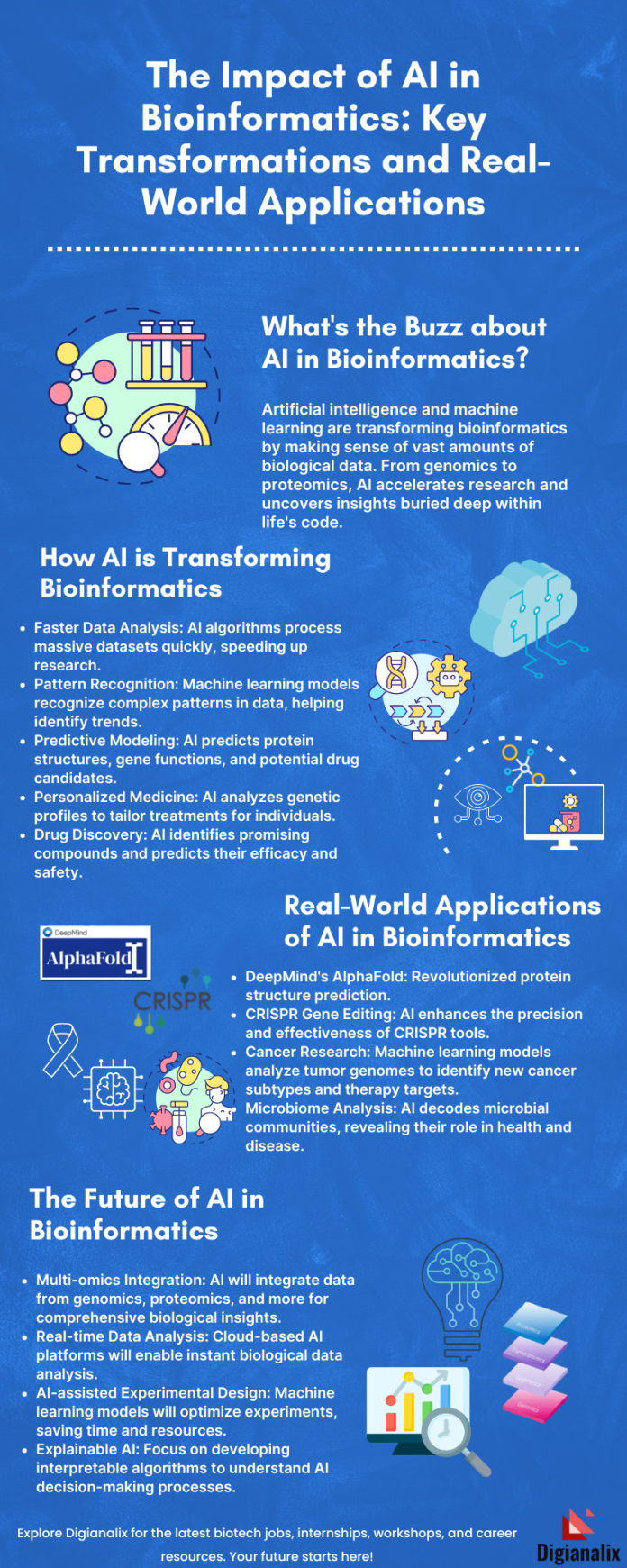Hey there, biotech enthusiasts! 👋 Ready to dive into the fascinating world where artificial intelligence meets biology? Let’s explore how AI in bioinformatics is revolutionizing the way we analyze biological data and make groundbreaking discoveries!
🧬 What’s the buzz about AI in bioinformatics?
Artificial intelligence and machine learning have already turned out to be game-changers in many fields, and bioinformatics does not seem to become an exception. These technologies make sense of the huge biological data produced every day. AI structural genomics and proteomics accelerate research and discover these once hidden insights in the complexity of life’s code.
🚀 How is AI transforming bioinformatics?
- Faster data analysis: AI algorithms can process massive datasets in a fraction of the time it would take humans, speeding up research and discovery.
- Pattern recognition: Machine learning models excel at identifying complex patterns in biological data, helping researchers spot trends and connections they might otherwise miss.
- Predictive modeling: AI can predict protein structures, gene functions, and even potential drug candidates, saving time and resources in the lab.
- Personalized medicine: By analyzing individual genetic profiles, AI is paving the way for tailored treatments and more effective healthcare strategies.
- Drug discovery: AI-powered platforms are revolutionizing the drug discovery process, identifying promising compounds and predicting their efficacy and safety.
🔬 Real-world applications of AI in bioinformatics
Let’s look at some exciting examples of how AI is making waves in the biotech world:
- DeepMind’s AlphaFold: This AI system has made a massive leap in predicting protein structures, solving a 50-year-old challenge in biology.
- CRISPR gene editing: AI is helping researchers design more precise and effective CRISPR tools for genetic engineering.
- Cancer research: Machine learning models are analyzing tumor genomes to identify new cancer subtypes and potential treatment targets.
- Microbiome analysis: AI algorithms are decoding the complexities of microbial communities, shedding light on their role in human health and disease.
💡 The future of AI in bioinformatics
As AI continues to evolve, we can expect even more exciting developments in bioinformatics:
- Multi-omics integration: AI will help us combine data from various “-omics” fields (genomics, proteomics, metabolomics) for a more holistic understanding of biological systems.
- Real-time data analysis: Cloud-based AI platforms will enable instant analysis of biological data, accelerating research and clinical applications.
- AI-assisted experimental design: Machine learning models will help scientists optimize their experiments, saving time and resources.
- Explainable AI: As AI models become more complex, there’s a growing focus on developing interpretable algorithms that can explain their decision-making process to researchers.
🤔 What do you think?
Are you excited about the potential of AI in bioinformatics? How do you see it impacting your work or studies in the biotech field? Share your thoughts in the comments below!
Want to stay updated on the latest in AI and bioinformatics? Don’t forget to subscribe to our site and follow us on social media for more cutting-edge biotech insights!




